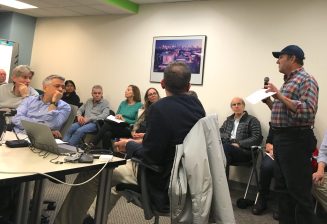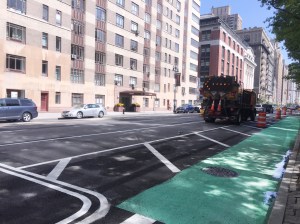Streetsblog Gets Action: Manhattan Community Board Retreats on Gag Rule

An influential Manhattan community board has abandoned its bid to muzzle members with ties to a prominent street-safety organization, a move undertaken after Streetsblog exposed the effort to change the panel’s bylaws.
Last Tuesday, Community Board 7, which comprises the Upper West Side from 59th to 110th streets, approved a new set of bylaws that dropped a draft provision that sought to abridge the voting rights of members who belong to advocacy organizations.
The draft rules would have prohibited anyone belonging to the leadership of a non-profit group from voting if “the organization has taken a position” on a public-policy matter before the board and also would have prohibited such individuals from heading committees “if that committee regularly reviews matters before it which concern that organization’s interests.”
The approved bylaws expunged that language to keep existing guidelines to bar voting on an issue before the board with which the member “has a direct or indirect financial interest” or if the member “serves as an officer, director, employee of or has a professional interest with respect to an organization which is financially affected directly or indirectly by such matter” — language which closely hews to the city’s Conflicts of Interest Law.
The changes follow a May 27 Streetsblog story highlighting how the bylaws task force of the once-progressive community board hopped to change the rules in order to limit voting by board members with ties to the street-safety group Transportation Alternatives, which has an avid and growing Manhattan constituency. Prominent members of the bylaws task force long had opposed the activists’ successful promotion of protected bike lanes and other street-safety measures, such as a resolution on limiting free parking in the neighborhood. They had written letter a letter in 2020 to CB7’s then chairman seeking to remove the Transportation Alternatives members from their stronghold on the Transportation Committee.
The draft rules, however, were so broadly worded that they could have had a significant significant chilling effect on the voting rights of activists of all stripes — and indeed on board membership itself. All five city borough presidents try to appoint the boards’ members from among the most knowledgeable and active community advocates — people who, as such, often have memberships or leadership roles in many groups. Manhattan Borough President Mark Levine personally stepped in to thwart the CB7 draft effort.
“We are glad to have worked with CB7’s bylaws committee to ensure the bylaws adopted were consistent with Conflicts of Interest Board guidelines and we will continue to provide guidance and support to ensure that every member enjoys the opportunity to participate and engage in the governance of their local community,” Levine’s spokesman said.
The chairwoman of the bylaws task force, Susan Schwartz, acknowledged the defeat at the Tuesday night board meeting at which the new bylaws passed.
“It was ugly last week when the borough president’s office took us to task on the conflicts-of-interest part,” Schwartz said. “And I basically had a mutiny on my hands with the task force saying, ‘How could you get into that? We’re not going to support you any more.’ And then we came to a conclusion that … we had no choice because of the Conflicts of Interest Law.”
The revised bylaws did not mollify the members against whom the restrictive language was aimed, however.
Ken Coughlin, whose membership on TA’s Advisory Council makes him toxic to CB7’s car-lovers, said he was “glad the bylaws task force was compelled at the 11th hour to drop its ill-advised attempt to silence board members who also happen to be affiliated with advocacy groups,” but added that “many other provisions … should have concerned” the borough president, such as new rules that “concentrate power in the chair and a few other board officers.”
He also objected to requiring members of the public who speak at board meetings “to disclose their connection to the district and any relevant affiliations.”
“These bylaws raise the question of why individual boards are even permitted to create their own bylaws,” Coughlin said. “Why not have standardized rules for all Manhattan community boards, or citywide?”
Howard Yaruss, the co-chairman of the Transportation Committee and also a TA Advisory Council member, also voted against the rules because the changes “further concentrate power in a small group of board members who generally oppose measures to make our streets safer.” He was referring to rules that enhanced the decision-making power of the executive committee over the steering committee in certain instances, such as during the summer when the full board and its committees does not meet.
The new bylaws passed the board with 30-8, with seven members abstaining. Activists beyond the Upper West Side had been keenly watching the vote out of concern that other boards would try to silence some members’ views.
The attempt to muzzle Upper West Side activists was only the latest bid by car-owners on community boards to limit the influence of street-safety advocates. A number of years ago, Manhattan CB8, on the Upper East Side, tried to restrict a member who was an employee of a bike-related not-for-profit from voting on bike-related matters. (The Manhattan Borough President’s Office also stepped in in that case, siding with the not-for-profit staffer.)
In 2018, then Council Member Laurie Cumbo removed safety activist Hilda Cohen from CB2 in brownstone Brooklyn, claiming that Cohen had served long enough even though Cumbo renewed the terms of longer-serving members.

